新概念英语第一册Lesson73-74(共52张PPT)
文档属性
| 名称 | 新概念英语第一册Lesson73-74(共52张PPT) | 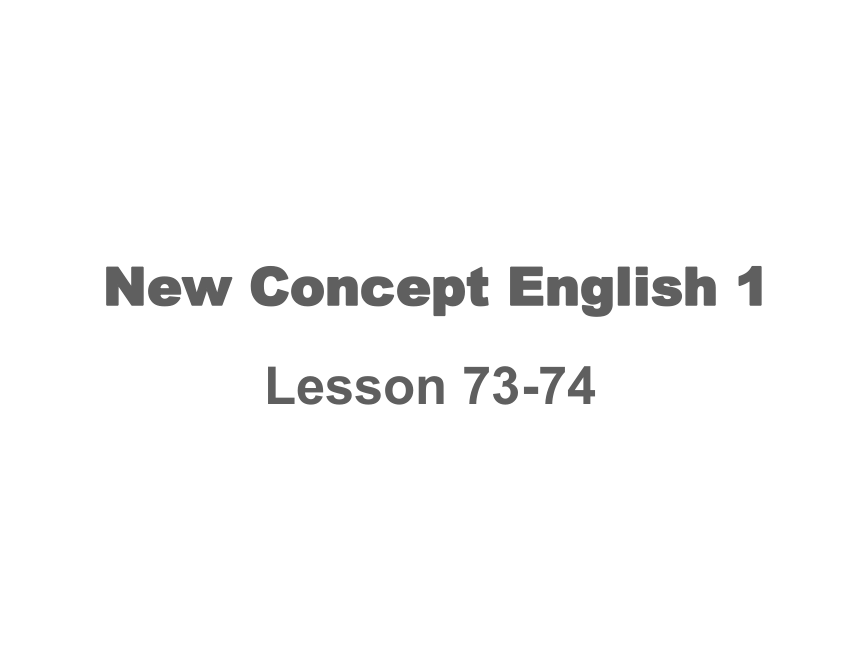 | |
| 格式 | ppt | ||
| 文件大小 | 4.5MB | ||
| 资源类型 | 教案 | ||
| 版本资源 | 新概念英语 | ||
| 科目 | 英语 | ||
| 更新时间 | 2024-04-09 09:28:55 | ||
图片预览

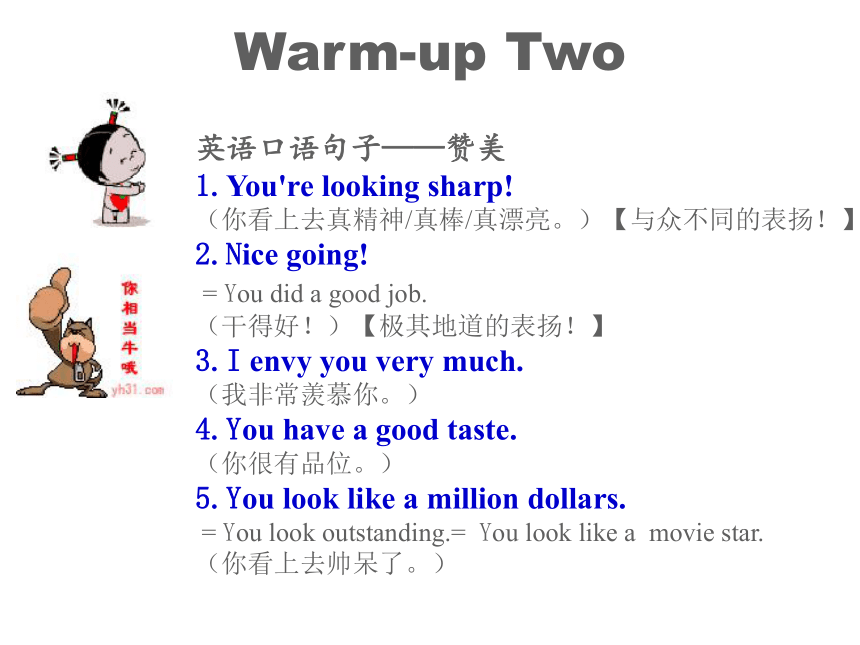
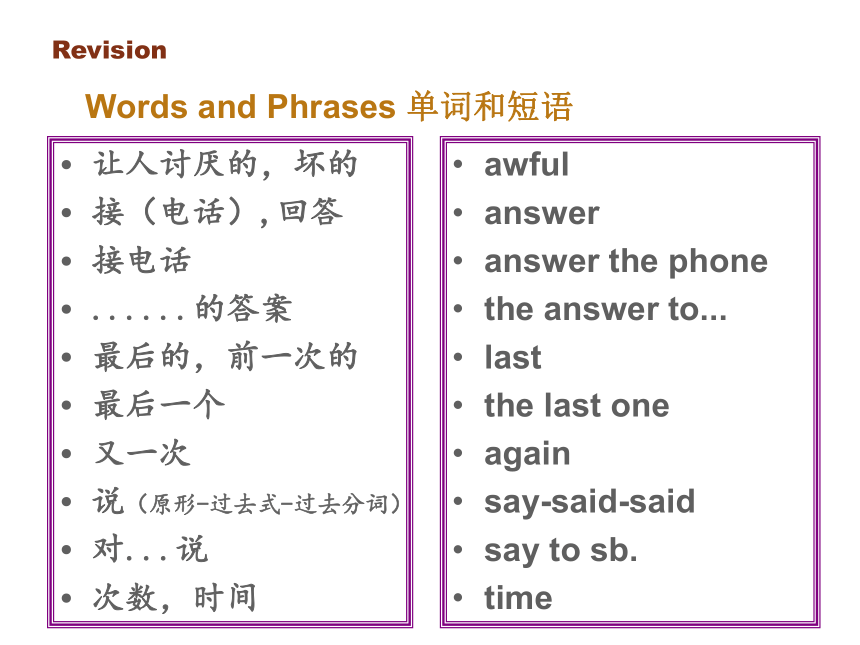
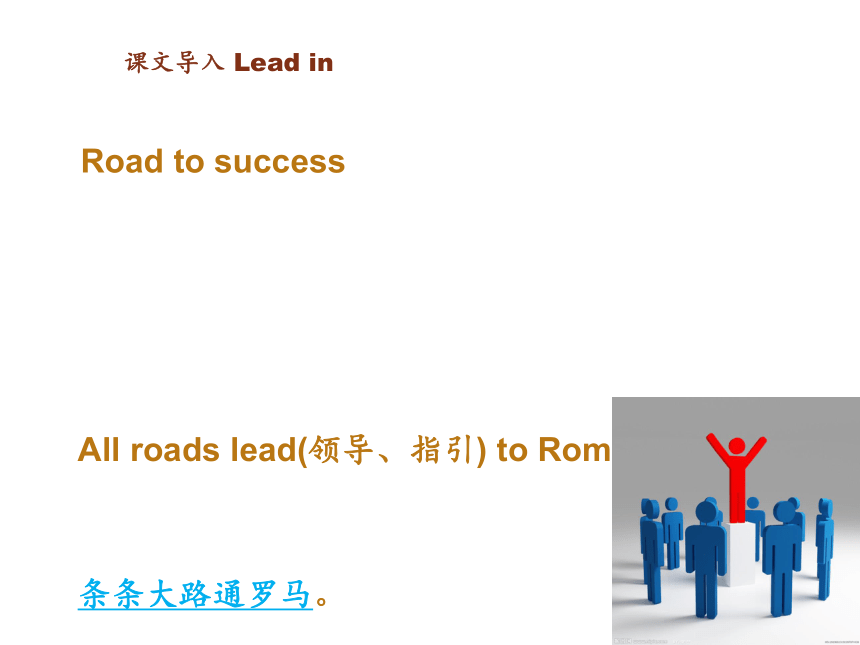
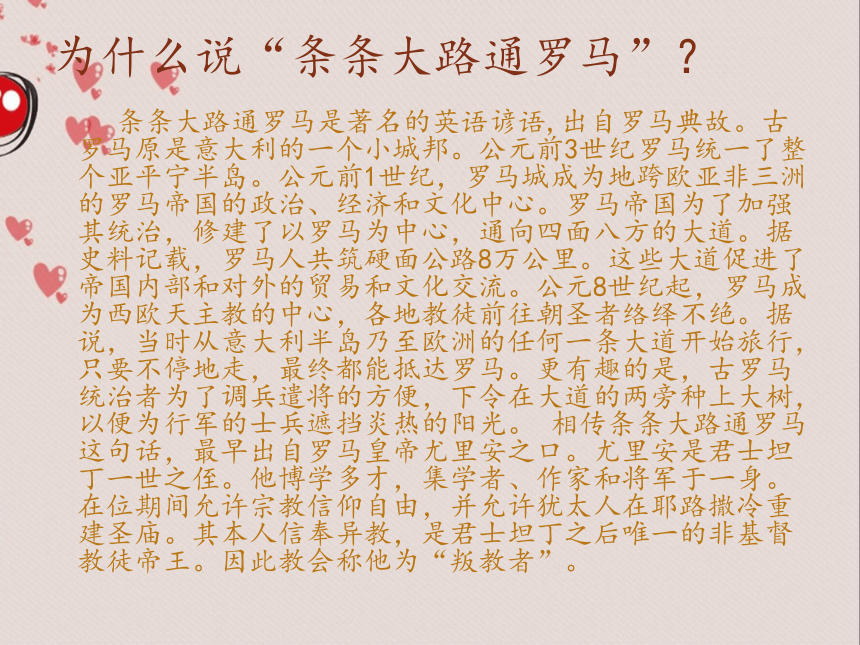
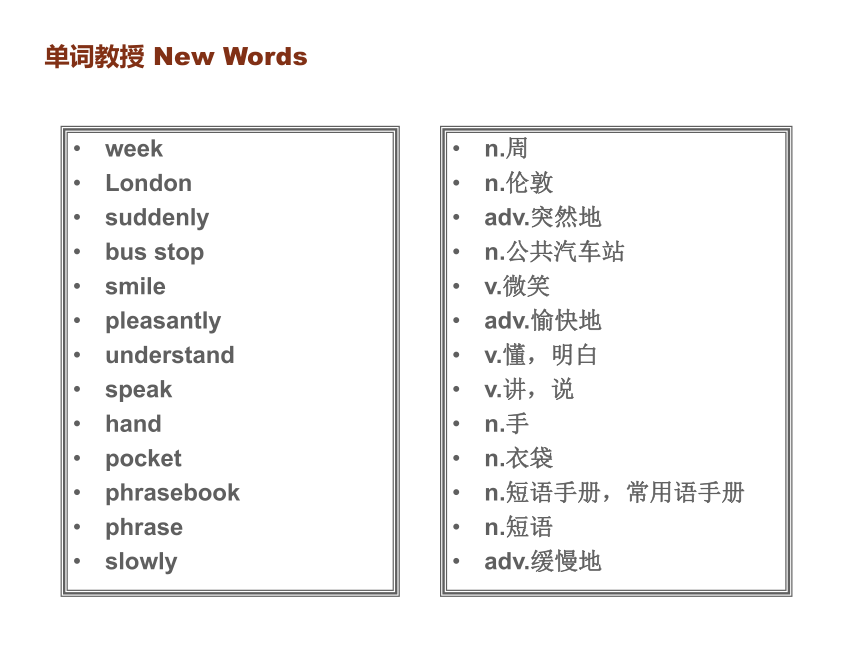
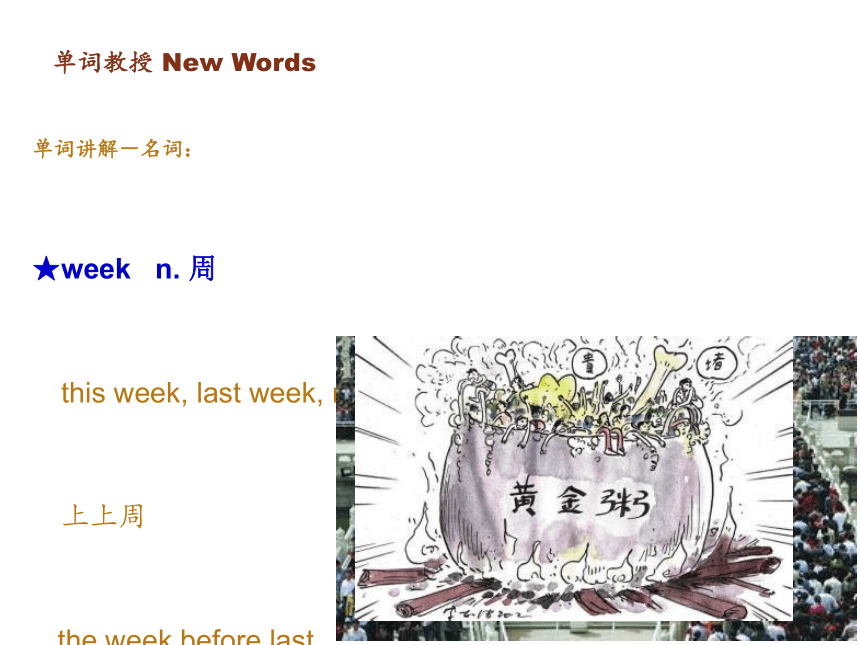
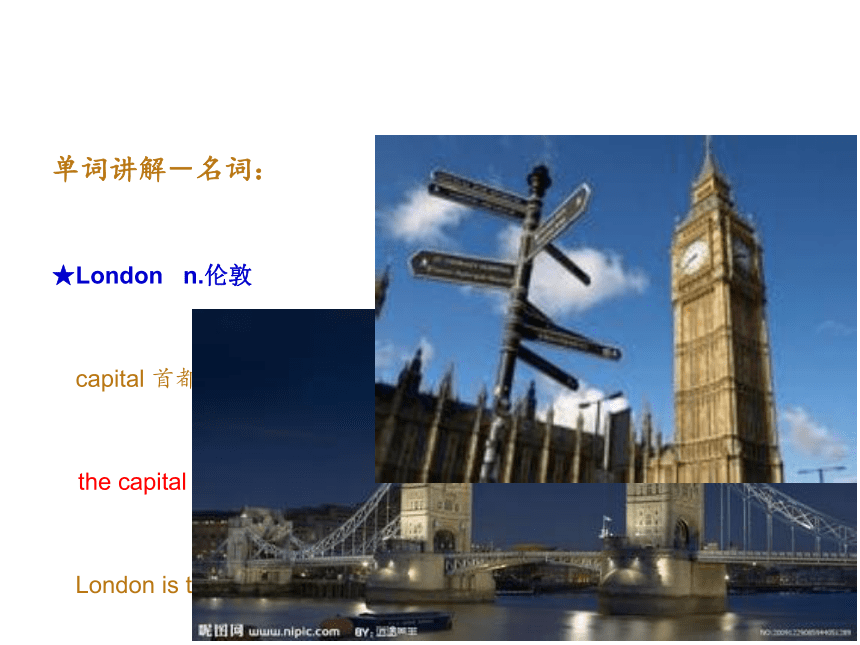
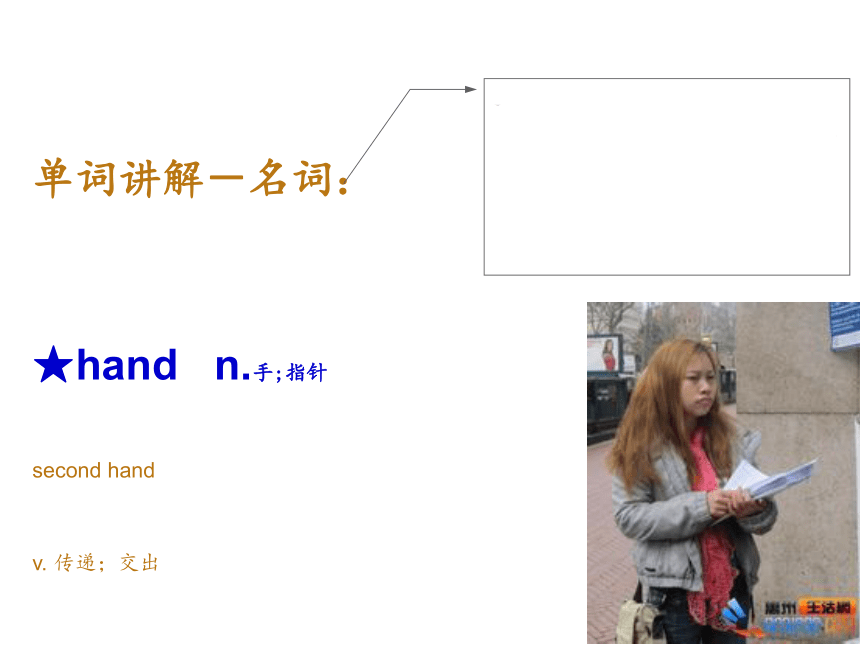
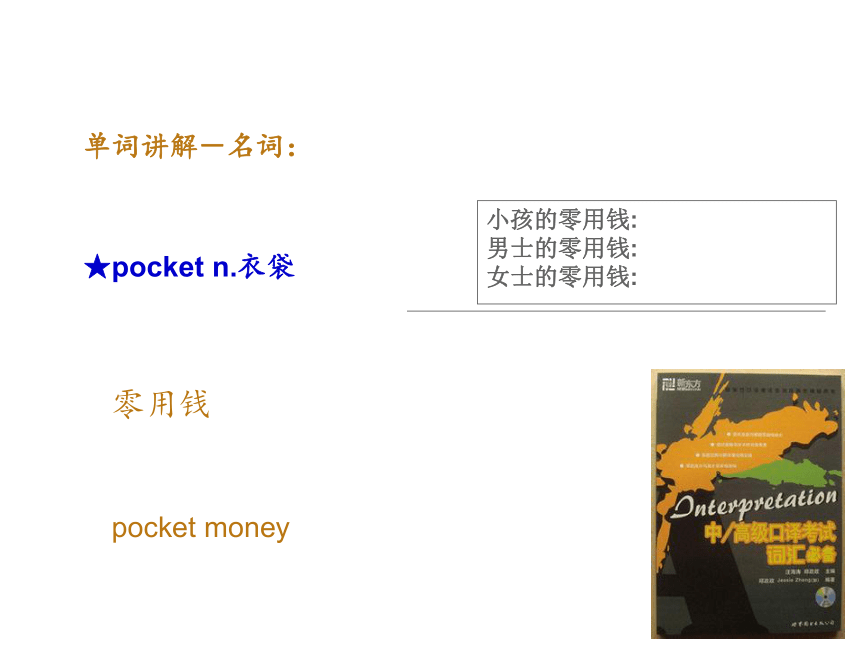
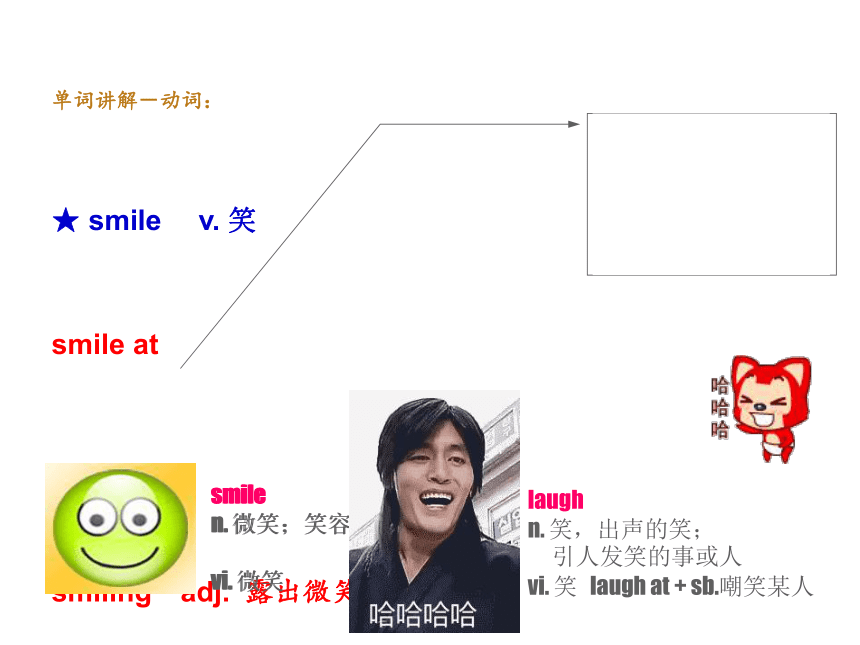
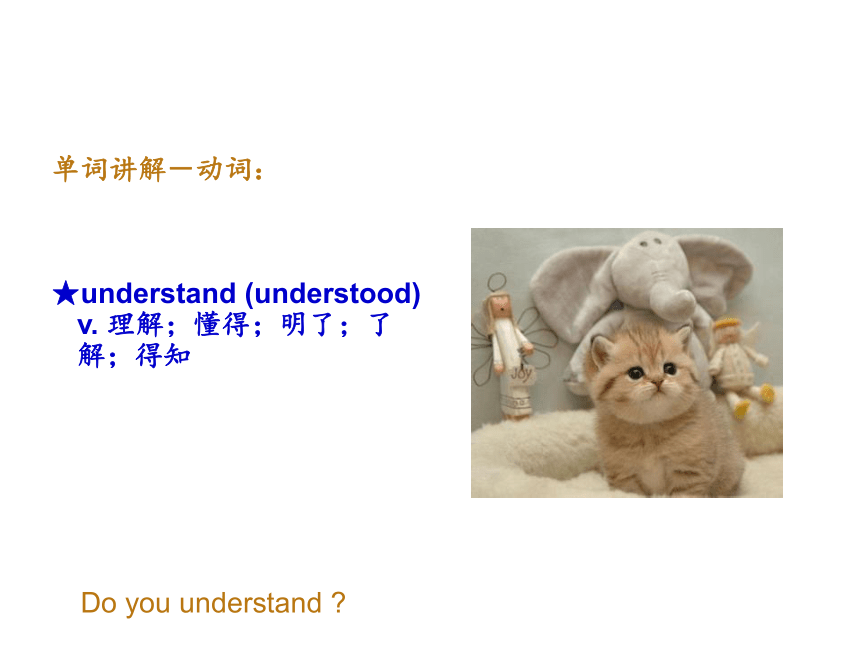
文档简介
(共52张PPT)
Lesson 73-74
New Concept English 1
英语口语句子——赞美
1.You're looking sharp!
(你看上去真精神/真棒/真漂亮。)【与众不同的表扬!】
2.Nice going!
= You did a good job.
(干得好!)【极其地道的表扬!】
3.I envy you very much.
(我非常羡慕你。)
4.You have a good taste.
(你很有品位。)
5.You look like a million dollars.
= You look outstanding.= You look like a movie star.
(你看上去帅呆了。)
Warm-up Two
Revision
Words and Phrases 单词和短语
awful
answer
answer the phone
the answer to...
last
the last one
again
say-said-said
say to sb.
time
让人讨厌的,坏的
接(电话),回答
接电话
......的答案
最后的,前一次的
最后一个
又一次
说(原形-过去式-过去分词)
对...说
次数,时间
课文导入 Lead in
Road to success
All roads lead(领导、指引) to Rome.
条条大路通罗马。
为什么说“条条大路通罗马”?
条条大路通罗马是著名的英语谚语,出自罗马典故。古罗马原是意大利的一个小城邦。公元前3世纪罗马统一了整个亚平宁半岛。公元前1世纪,罗马城成为地跨欧亚非三洲的罗马帝国的政治、经济和文化中心。罗马帝国为了加强其统治,修建了以罗马为中心,通向四面八方的大道。据史料记载,罗马人共筑硬面公路8万公里。这些大道促进了帝国内部和对外的贸易和文化交流。公元8世纪起,罗马成为西欧天主教的中心,各地教徒前往朝圣者络绎不绝。据说,当时从意大利半岛乃至欧洲的任何一条大道开始旅行,只要不停地走,最终都能抵达罗马。更有趣的是,古罗马统治者为了调兵遣将的方便,下令在大道的两旁种上大树,以便为行军的士兵遮挡炎热的阳光。 相传条条大路通罗马这句话,最早出自罗马皇帝尤里安之口。尤里安是君士坦丁一世之侄。他博学多才,集学者、作家和将军于一身。在位期间允许宗教信仰自由,并允许犹太人在耶路撒冷重建圣庙。其本人信奉异教,是君士坦丁之后唯一的非基督教徒帝王。因此教会称他为“叛教者”。
单词教授 New Words
week
London
suddenly
bus stop
smile
pleasantly
understand
speak
hand
pocket
phrasebook
phrase
slowly
n.周
n.伦敦
adv.突然地
n.公共汽车站
v.微笑
adv.愉快地
v.懂,明白
v.讲,说
n.手
n.衣袋
n.短语手册,常用语手册
n.短语
adv.缓慢地
单词教授 New Words
单词讲解-名词:
★week n. 周
this week, last week, next week等,前面不能加介词
上上周
the week before last
下下周
the week after next
golden week
weekly
单词讲解-名词:
★London n.伦敦
capital 首都,省会,资本;大写的
the capital of… …的首都
London is the capital of Britain.
北京是中国的首都。
Beijing is the captal of China.
英国的英文全称:
The United Kingdom of Great Britain and Northern Ireland
大不列颠及北爱尔兰联合王国
绰号:日不落帝国
单词讲解-名词:
★hand n.手;指针
second hand
v. 传递;交出
hand in 上交
hand out 发放(传单、讲义等)
green hand
【相关知识】
green hand,是指刚入行新手,没经验的人,也叫”菜鸟“。
由来:England是个岛国,船是重要的交通工具,为保养船只,常用与海水相近的绿色油漆来漆船,不熟练的油漆工,工作时常会双手沾满油漆,变成green hand。
单词讲解-名词:
★pocket n.衣袋
零用钱
pocket money
He has something in his pocket.
这家伙有点水平/他胸有成竹。
★phrase n.短语
phrasebook n.短语手册,常用语手册
小孩的零用钱: pocket money
男士的零用钱: beer money
女士的零用钱:
单词讲解-动词:
★ smile v. 笑
smile at
smiling adj. 露出微笑的
smile n.
a sweet smile
have a warm smile
拥有一个温馨微笑
have a big smile
开怀大笑
have a happy smile
有幸福笑容
smile
n. 微笑;笑容
vi. 微笑
laugh
n. 笑,出声的笑;
引人发笑的事或人
vi. 笑 laugh at + sb.嘲笑某人
smile
n. 微笑;笑容
vi. 微笑
单词讲解-动词:
★understand (understood) v. 理解;懂得;明了;了解;得知
Do you understand
understanding n. 理解力;adj.善解人意的
单词讲解-动词:
★speak(spoke) v.讲,说
The baby is learning to speak.
这个孩子正在牙牙学语。
speak up 有话直说
speak louder 说的大声一点
speak out 大点声说,直说
★lose v. (使)迷路,遗失,失去(lost)
迷路
lose one’s way
lose one's job
lose heart 失去信心,泄气
be lost in 迷恋于,专心于
lose heart--丧失信心 但是如果是lose heart to sb的话 是爱上某人的意思
break one's heart--伤心
cry one's heart out--伤心欲绝
lose heart 失去信心,泄气
单词讲解-副词:
★suddenly adv.突然地
sudden adj.突然的
突然的雨
a sudden rain
sudden-suddenly adv.突然地
单词讲解-副词:
★pleasantly adv.愉快地
我们在很愉快的交谈。
We are talking pleasantly.
pleasant 愉快的-pleasantly adv.愉快地
★slowly adv.缓慢地
slow adj.慢慢的
v.放慢
slow down 减速,放慢速度
单词复习测试
n.周
n.伦敦
adv.突然地
n.公共汽车站
v.微笑
adv.愉快地
v.懂,明白
v.讲,说
n.手
n.衣袋
n.短语手册,常用语手册
n.短语
adv.缓慢地
week
London
suddenly
bus stop
smile
pleasantly
understand
speak
hand
pocket
phrasebook
phrase
slowly
课文讲解 Passage
The way to King Street
and并列句
know-knew
lose-lost
lose one's way
see-saw
ask the way 问路
say-said
say to oneself
反身代词:
myself, yourself, ourselves, yourselves, himself, herself, itself, themselves
tell sb. the way to sp. 告诉某人去…的路
你可以告诉我你的地址吗?
Can you tell me your address, please
你能告诉我去北海公园的路吗?
Can you tell me the way to the Beihai Park, please
课文讲解 Passage
smile-smiled
understand-understood
speak-spoke
is/am-was
are-were
put-put(动词和过去式同形)
put…into…
把…放进…里
take-took
take out 拿出,取出
takeout 快餐店的外卖
takeaway
find-found
read-read(过去式和原形一样)
say-said
Find out adverbs from the passage:
1.suddenly
突然地
2.pleasantly
愉快地
3.slowly
慢慢地
课文讲解 Passage
The way to King Street
Last week Mrs. Mills went to London. She does not know London very well, and she lost her way.
Suddenly, she saw a man near a bus stop. 'I can ask him the way.' she said to herself.
'Excuse me,' she said. 'Can you tell me the way to King Street, please '
The man smiled pleasantly. He did not understand English! He spoke German. He was a tourist.
Then he put his hand into pocket, and took out a phrasebook.
He opened the book and found a phrase. He read the phrase slowly. 'I am sorry,' he said. 'I do not speak English.'
New words:
hurriedly adv.匆忙地
cut (cut) v.割,切
thirstily adv.口渴地
go (went) v.走
greet v.问候,打招呼
Lesson 74
Lesson 74
★hurriedly adv.匆忙地 = in a hurry
hurry n.匆忙
我们不得不匆忙的说再见。
We have to say goodbye in a hurry/hurriedly.
★cut (cut)v.割,切
翘课
cut class
Cut it out.
打住,停住吧! = shut up
haircut
action --- cut
Lesson 74
★thirstily adv.口渴地
thirsty adj.口渴的
★greet v.问候,打招呼
greet sb.
Lesson 74
Review the words:
hurriedly adv.匆忙地
cut (cut) v.割,切
thirstily adv.口渴地
go (went) v.走
greet v.问候,打招呼
Lesson 74
A. 模仿例句完成以下句子。
Example:
She smiled ______ . (pleasant)
She smiled pleasantly.
Complete these sentences.
1 He read the phrase ______ . (slow)
2 He worked ______ . (lazy)
3 He cut himself ______ . (bad)
4 He worked ______ . (careful)
5 The door opened ______ . (sudden)
P151
carefully
suddenly
slowly
lazily
badly
He shaved hurriedly this morning and cut himself badly.
先找动词再找副词
找出副词修饰哪个动词
翻译句子
shave (shaved) vt. 刮胡子
hurriedly adv. 匆忙地
I gave him a glass of milk and he drank it thirstily.
drink (drank) v.喝
thirstily adv. 口渴地
Lesson 74
The bus went slowly yesterday afternoon and we arrived late.
go (went) v. 去,出发
arrive (arrived) v.到达
slowly adv. 缓慢地
late adv.迟地,晚地
Lesson 74
We enjoyed ourselves very much last night.
enjoy (enjoyed) v.享受
very much adv.非常
Lesson 74
He took a cake and ate it quickly.
eat (ate) v.吃
quickly adv.快地
Lesson 74
微博:58岁大姐吃得太多,胃爆炸了
著名微博达人“@营养师顾中一”是北京友谊医院的营养师,拥有上百万粉丝,前天他转发了一条微博,说的是一个病例:“患者女性,58岁,进食大量食物及啤酒,餐后突发腹痛腹胀1小时来院急诊,患者腹胀如鼓,全腹压痛。腹部CT显示,胃扩张。”
尤其让人惊讶的是:“进腹时腹腔内高压可燃气体喷出,灭火后手术继续。腹腔内大量黑色浑浊液体混有食物残渣,胃壁破损严重,胃小弯贲门至幽门全程炸裂。”
又是“胃爆炸”,又是“起火”,这场手术真是让人紧张。最后的结果也是十分令人遗憾,由于患者病情太重,不得不全胃切除。
They worked very hard this morning.
work v. 工作
hard adv.努力地
别的国家主席出国访问
都是带自己的老婆,
而奥巴马出国却总
是带着别人家的老婆。
Lesson 74
He swam very well this afternoon.
swim(swam) v. 游泳
well adv. 好
Lesson 74
语法讲解 Grammar in use
形容词、副词
形容词是什么?副词又是什么?我们用一个句子来说明。
She is a good student, and she works hard. 本句中,good 就是形容词,而hard 则是副词。
形容词用来修饰名词或代词, 表示人或事物的性质, 状态,和特征。
副词是一种用来修饰动词,形容词,副词或全句的词,说明时间,地点,程度,方式等概念。
形容词变副词的规则:
1.一般情况下在形容词词尾直接加-ly。
如:
real-really; helpful-helpfully;
careful-carefully; hopeful-hopefully;
slow-slowly; quick-quickly;
quiet-quietly ; quick---quickly
语法讲解 Grammar in use
形容词变副词的规则:
2. 以辅音字母加y结尾的形容词要变y为i,然后再加-ly。
如:
busy busily
angry angrily
easy easily
happy happily
语法讲解 Grammar in use
形容词变副词的规则:
3.某些以辅音字母加不发音的字母e结尾和以-ue结尾的形容词要先去掉e,然后再加-y或-ly。
如:
terrible terribly
true truly
语法讲解 Grammar in use
需注意: friendly; motherly; lovely等词是形容词而非副词。
在英语中,有些词既可以作形容词,又可以作副词,如early, much, fast, little, wide, loud等。 由于这类词词性虽不同,但词形却一样,这就需要大家学会在特定语境中判断它们各自的词性(adv.副词 adj.形容词)。
例句:
Thank you very much. (adv.)
There is much water in the river. (adj.)
The music is too loud. Please turn it down. (adj.)
He speaks loud enough. So everyone in the room can hear what he said. (adv.)
另外,还有一类副词和形容词词义相同,但拼写却不同,如well和good。
He speaks good(adj) English. 。
He speaks English well(adv). 。
hard---hard late-late good----well
语法讲解 Grammar in use
Written exercises:
B. Look at this table.
模仿下面的例句,从上面的表格中选出恰当的词和词组,写出8句话。
Example:
He read the phrase slowly.
练习讲解 Exercise
1. The man ____(speak) very slowly, but I didn’t understand him.
2.The tourist ____(lose) his way in Hong Kong.
3.My friend ____(meet) me at the railway station.
4.Jill’s father _____(give) her the key to the front door.
5.Mrs.Mills ____(is) in London last week.
6.She ____(go) to Paris last year .
7.The man _____(drink) their tea very quickly.
8.We ____(see) our friends at the bus stop.
9. The students_________ (understand) me because I spoke very slowly and carefully.
10. The boy _______(find) some money and _____(take) it to his teacher.
spoke
lost
met
gave
was
went
drunk
saw
understood
found
took
11. We _____(swim) in the sea yesterday.
12. That man ____(do) a very good job for us.
13. The girl ____(cut) her leg very badly.
14. I _____(read) the exercise very carefully.
15. --Did she speak to you
--Yes , she _____(say)' Hello’.
swam
did
cut
read
said
练习讲解 Exercise
单词
suddenly
bus stop
smile
pleasantly
understand
speak
pocket
phrasebook
slowly
总结 Conclusion
总结 Conclusion
课文 Retell the text
Last week ,Mrs. Mills ,went to...,
doesn't know... very well
got lost, saw a man, ask him the way
excuse..., tell...the way to...
smiled pleasantly, didn't understand
German, tourist,
put his hand into..., took out
opened..., found... read...slowly
sorry..., do not speak...
一、选择题:
1.My father ____ his hand into the bag, and ____ out a story book.
A. putted; taked B. put; take C. put; took D. Putting; taking
2.The waiter smiled ____ and showed me the menu.
A. pleasantly B. friendly C. pleasant D. friend
3.It suddenly started to rain. We ran into the house ____
A. hurry B. hurried C. hurriedly D. in hurry
4.John can speak English ____
A. very welly B. very goodly C. very good D. very well
综合练习 Exercise
二、句型转换:
1.The child near the bus stop lost his way.(对划线部分提问)
Which child lost his way
2.Last week, Mrs. Mills went to London.(对划线部分提问)
Where did Mrs. Mills go last week
3.Jack ate the egg quickly.(对划线部分提问)
How did Jack eat the egg
综合练习 Exercise
1 抄写单词5+1+1
2 预习第75-76课
3 背诵课文
作业 Homework
背诵时刻
Lesson 73-74
New Concept English 1
英语口语句子——赞美
1.You're looking sharp!
(你看上去真精神/真棒/真漂亮。)【与众不同的表扬!】
2.Nice going!
= You did a good job.
(干得好!)【极其地道的表扬!】
3.I envy you very much.
(我非常羡慕你。)
4.You have a good taste.
(你很有品位。)
5.You look like a million dollars.
= You look outstanding.= You look like a movie star.
(你看上去帅呆了。)
Warm-up Two
Revision
Words and Phrases 单词和短语
awful
answer
answer the phone
the answer to...
last
the last one
again
say-said-said
say to sb.
time
让人讨厌的,坏的
接(电话),回答
接电话
......的答案
最后的,前一次的
最后一个
又一次
说(原形-过去式-过去分词)
对...说
次数,时间
课文导入 Lead in
Road to success
All roads lead(领导、指引) to Rome.
条条大路通罗马。
为什么说“条条大路通罗马”?
条条大路通罗马是著名的英语谚语,出自罗马典故。古罗马原是意大利的一个小城邦。公元前3世纪罗马统一了整个亚平宁半岛。公元前1世纪,罗马城成为地跨欧亚非三洲的罗马帝国的政治、经济和文化中心。罗马帝国为了加强其统治,修建了以罗马为中心,通向四面八方的大道。据史料记载,罗马人共筑硬面公路8万公里。这些大道促进了帝国内部和对外的贸易和文化交流。公元8世纪起,罗马成为西欧天主教的中心,各地教徒前往朝圣者络绎不绝。据说,当时从意大利半岛乃至欧洲的任何一条大道开始旅行,只要不停地走,最终都能抵达罗马。更有趣的是,古罗马统治者为了调兵遣将的方便,下令在大道的两旁种上大树,以便为行军的士兵遮挡炎热的阳光。 相传条条大路通罗马这句话,最早出自罗马皇帝尤里安之口。尤里安是君士坦丁一世之侄。他博学多才,集学者、作家和将军于一身。在位期间允许宗教信仰自由,并允许犹太人在耶路撒冷重建圣庙。其本人信奉异教,是君士坦丁之后唯一的非基督教徒帝王。因此教会称他为“叛教者”。
单词教授 New Words
week
London
suddenly
bus stop
smile
pleasantly
understand
speak
hand
phrasebook
phrase
slowly
n.周
n.伦敦
adv.突然地
n.公共汽车站
v.微笑
adv.愉快地
v.懂,明白
v.讲,说
n.手
n.衣袋
n.短语手册,常用语手册
n.短语
adv.缓慢地
单词教授 New Words
单词讲解-名词:
★week n. 周
this week, last week, next week等,前面不能加介词
上上周
the week before last
下下周
the week after next
golden week
weekly
单词讲解-名词:
★London n.伦敦
capital 首都,省会,资本;大写的
the capital of… …的首都
London is the capital of Britain.
北京是中国的首都。
Beijing is the captal of China.
英国的英文全称:
The United Kingdom of Great Britain and Northern Ireland
大不列颠及北爱尔兰联合王国
绰号:日不落帝国
单词讲解-名词:
★hand n.手;指针
second hand
v. 传递;交出
hand in 上交
hand out 发放(传单、讲义等)
green hand
【相关知识】
green hand,是指刚入行新手,没经验的人,也叫”菜鸟“。
由来:England是个岛国,船是重要的交通工具,为保养船只,常用与海水相近的绿色油漆来漆船,不熟练的油漆工,工作时常会双手沾满油漆,变成green hand。
单词讲解-名词:
★pocket n.衣袋
零用钱
pocket money
He has something in his pocket.
这家伙有点水平/他胸有成竹。
★phrase n.短语
phrasebook n.短语手册,常用语手册
小孩的零用钱: pocket money
男士的零用钱: beer money
女士的零用钱:
单词讲解-动词:
★ smile v. 笑
smile at
smiling adj. 露出微笑的
smile n.
a sweet smile
have a warm smile
拥有一个温馨微笑
have a big smile
开怀大笑
have a happy smile
有幸福笑容
smile
n. 微笑;笑容
vi. 微笑
laugh
n. 笑,出声的笑;
引人发笑的事或人
vi. 笑 laugh at + sb.嘲笑某人
smile
n. 微笑;笑容
vi. 微笑
单词讲解-动词:
★understand (understood) v. 理解;懂得;明了;了解;得知
Do you understand
understanding n. 理解力;adj.善解人意的
单词讲解-动词:
★speak(spoke) v.讲,说
The baby is learning to speak.
这个孩子正在牙牙学语。
speak up 有话直说
speak louder 说的大声一点
speak out 大点声说,直说
★lose v. (使)迷路,遗失,失去(lost)
迷路
lose one’s way
lose one's job
lose heart 失去信心,泄气
be lost in 迷恋于,专心于
lose heart--丧失信心 但是如果是lose heart to sb的话 是爱上某人的意思
break one's heart--伤心
cry one's heart out--伤心欲绝
lose heart 失去信心,泄气
单词讲解-副词:
★suddenly adv.突然地
sudden adj.突然的
突然的雨
a sudden rain
sudden-suddenly adv.突然地
单词讲解-副词:
★pleasantly adv.愉快地
我们在很愉快的交谈。
We are talking pleasantly.
pleasant 愉快的-pleasantly adv.愉快地
★slowly adv.缓慢地
slow adj.慢慢的
v.放慢
slow down 减速,放慢速度
单词复习测试
n.周
n.伦敦
adv.突然地
n.公共汽车站
v.微笑
adv.愉快地
v.懂,明白
v.讲,说
n.手
n.衣袋
n.短语手册,常用语手册
n.短语
adv.缓慢地
week
London
suddenly
bus stop
smile
pleasantly
understand
speak
hand
phrasebook
phrase
slowly
课文讲解 Passage
The way to King Street
and并列句
know-knew
lose-lost
lose one's way
see-saw
ask the way 问路
say-said
say to oneself
反身代词:
myself, yourself, ourselves, yourselves, himself, herself, itself, themselves
tell sb. the way to sp. 告诉某人去…的路
你可以告诉我你的地址吗?
Can you tell me your address, please
你能告诉我去北海公园的路吗?
Can you tell me the way to the Beihai Park, please
课文讲解 Passage
smile-smiled
understand-understood
speak-spoke
is/am-was
are-were
put-put(动词和过去式同形)
put…into…
把…放进…里
take-took
take out 拿出,取出
takeout 快餐店的外卖
takeaway
find-found
read-read(过去式和原形一样)
say-said
Find out adverbs from the passage:
1.suddenly
突然地
2.pleasantly
愉快地
3.slowly
慢慢地
课文讲解 Passage
The way to King Street
Last week Mrs. Mills went to London. She does not know London very well, and she lost her way.
Suddenly, she saw a man near a bus stop. 'I can ask him the way.' she said to herself.
'Excuse me,' she said. 'Can you tell me the way to King Street, please '
The man smiled pleasantly. He did not understand English! He spoke German. He was a tourist.
Then he put his hand into pocket, and took out a phrasebook.
He opened the book and found a phrase. He read the phrase slowly. 'I am sorry,' he said. 'I do not speak English.'
New words:
hurriedly adv.匆忙地
cut (cut) v.割,切
thirstily adv.口渴地
go (went) v.走
greet v.问候,打招呼
Lesson 74
Lesson 74
★hurriedly adv.匆忙地 = in a hurry
hurry n.匆忙
我们不得不匆忙的说再见。
We have to say goodbye in a hurry/hurriedly.
★cut (cut)v.割,切
翘课
cut class
Cut it out.
打住,停住吧! = shut up
haircut
action --- cut
Lesson 74
★thirstily adv.口渴地
thirsty adj.口渴的
★greet v.问候,打招呼
greet sb.
Lesson 74
Review the words:
hurriedly adv.匆忙地
cut (cut) v.割,切
thirstily adv.口渴地
go (went) v.走
greet v.问候,打招呼
Lesson 74
A. 模仿例句完成以下句子。
Example:
She smiled ______ . (pleasant)
She smiled pleasantly.
Complete these sentences.
1 He read the phrase ______ . (slow)
2 He worked ______ . (lazy)
3 He cut himself ______ . (bad)
4 He worked ______ . (careful)
5 The door opened ______ . (sudden)
P151
carefully
suddenly
slowly
lazily
badly
He shaved hurriedly this morning and cut himself badly.
先找动词再找副词
找出副词修饰哪个动词
翻译句子
shave (shaved) vt. 刮胡子
hurriedly adv. 匆忙地
I gave him a glass of milk and he drank it thirstily.
drink (drank) v.喝
thirstily adv. 口渴地
Lesson 74
The bus went slowly yesterday afternoon and we arrived late.
go (went) v. 去,出发
arrive (arrived) v.到达
slowly adv. 缓慢地
late adv.迟地,晚地
Lesson 74
We enjoyed ourselves very much last night.
enjoy (enjoyed) v.享受
very much adv.非常
Lesson 74
He took a cake and ate it quickly.
eat (ate) v.吃
quickly adv.快地
Lesson 74
微博:58岁大姐吃得太多,胃爆炸了
著名微博达人“@营养师顾中一”是北京友谊医院的营养师,拥有上百万粉丝,前天他转发了一条微博,说的是一个病例:“患者女性,58岁,进食大量食物及啤酒,餐后突发腹痛腹胀1小时来院急诊,患者腹胀如鼓,全腹压痛。腹部CT显示,胃扩张。”
尤其让人惊讶的是:“进腹时腹腔内高压可燃气体喷出,灭火后手术继续。腹腔内大量黑色浑浊液体混有食物残渣,胃壁破损严重,胃小弯贲门至幽门全程炸裂。”
又是“胃爆炸”,又是“起火”,这场手术真是让人紧张。最后的结果也是十分令人遗憾,由于患者病情太重,不得不全胃切除。
They worked very hard this morning.
work v. 工作
hard adv.努力地
别的国家主席出国访问
都是带自己的老婆,
而奥巴马出国却总
是带着别人家的老婆。
Lesson 74
He swam very well this afternoon.
swim(swam) v. 游泳
well adv. 好
Lesson 74
语法讲解 Grammar in use
形容词、副词
形容词是什么?副词又是什么?我们用一个句子来说明。
She is a good student, and she works hard. 本句中,good 就是形容词,而hard 则是副词。
形容词用来修饰名词或代词, 表示人或事物的性质, 状态,和特征。
副词是一种用来修饰动词,形容词,副词或全句的词,说明时间,地点,程度,方式等概念。
形容词变副词的规则:
1.一般情况下在形容词词尾直接加-ly。
如:
real-really; helpful-helpfully;
careful-carefully; hopeful-hopefully;
slow-slowly; quick-quickly;
quiet-quietly ; quick---quickly
语法讲解 Grammar in use
形容词变副词的规则:
2. 以辅音字母加y结尾的形容词要变y为i,然后再加-ly。
如:
busy busily
angry angrily
easy easily
happy happily
语法讲解 Grammar in use
形容词变副词的规则:
3.某些以辅音字母加不发音的字母e结尾和以-ue结尾的形容词要先去掉e,然后再加-y或-ly。
如:
terrible terribly
true truly
语法讲解 Grammar in use
需注意: friendly; motherly; lovely等词是形容词而非副词。
在英语中,有些词既可以作形容词,又可以作副词,如early, much, fast, little, wide, loud等。 由于这类词词性虽不同,但词形却一样,这就需要大家学会在特定语境中判断它们各自的词性(adv.副词 adj.形容词)。
例句:
Thank you very much. (adv.)
There is much water in the river. (adj.)
The music is too loud. Please turn it down. (adj.)
He speaks loud enough. So everyone in the room can hear what he said. (adv.)
另外,还有一类副词和形容词词义相同,但拼写却不同,如well和good。
He speaks good(adj) English. 。
He speaks English well(adv). 。
hard---hard late-late good----well
语法讲解 Grammar in use
Written exercises:
B. Look at this table.
模仿下面的例句,从上面的表格中选出恰当的词和词组,写出8句话。
Example:
He read the phrase slowly.
练习讲解 Exercise
1. The man ____(speak) very slowly, but I didn’t understand him.
2.The tourist ____(lose) his way in Hong Kong.
3.My friend ____(meet) me at the railway station.
4.Jill’s father _____(give) her the key to the front door.
5.Mrs.Mills ____(is) in London last week.
6.She ____(go) to Paris last year .
7.The man _____(drink) their tea very quickly.
8.We ____(see) our friends at the bus stop.
9. The students_________ (understand) me because I spoke very slowly and carefully.
10. The boy _______(find) some money and _____(take) it to his teacher.
spoke
lost
met
gave
was
went
drunk
saw
understood
found
took
11. We _____(swim) in the sea yesterday.
12. That man ____(do) a very good job for us.
13. The girl ____(cut) her leg very badly.
14. I _____(read) the exercise very carefully.
15. --Did she speak to you
--Yes , she _____(say)' Hello’.
swam
did
cut
read
said
练习讲解 Exercise
单词
suddenly
bus stop
smile
pleasantly
understand
speak
phrasebook
slowly
总结 Conclusion
总结 Conclusion
课文 Retell the text
Last week ,Mrs. Mills ,went to...,
doesn't know... very well
got lost, saw a man, ask him the way
excuse..., tell...the way to...
smiled pleasantly, didn't understand
German, tourist,
put his hand into..., took out
opened..., found... read...slowly
sorry..., do not speak...
一、选择题:
1.My father ____ his hand into the bag, and ____ out a story book.
A. putted; taked B. put; take C. put; took D. Putting; taking
2.The waiter smiled ____ and showed me the menu.
A. pleasantly B. friendly C. pleasant D. friend
3.It suddenly started to rain. We ran into the house ____
A. hurry B. hurried C. hurriedly D. in hurry
4.John can speak English ____
A. very welly B. very goodly C. very good D. very well
综合练习 Exercise
二、句型转换:
1.The child near the bus stop lost his way.(对划线部分提问)
Which child lost his way
2.Last week, Mrs. Mills went to London.(对划线部分提问)
Where did Mrs. Mills go last week
3.Jack ate the egg quickly.(对划线部分提问)
How did Jack eat the egg
综合练习 Exercise
1 抄写单词5+1+1
2 预习第75-76课
3 背诵课文
作业 Homework
背诵时刻
同课章节目录
